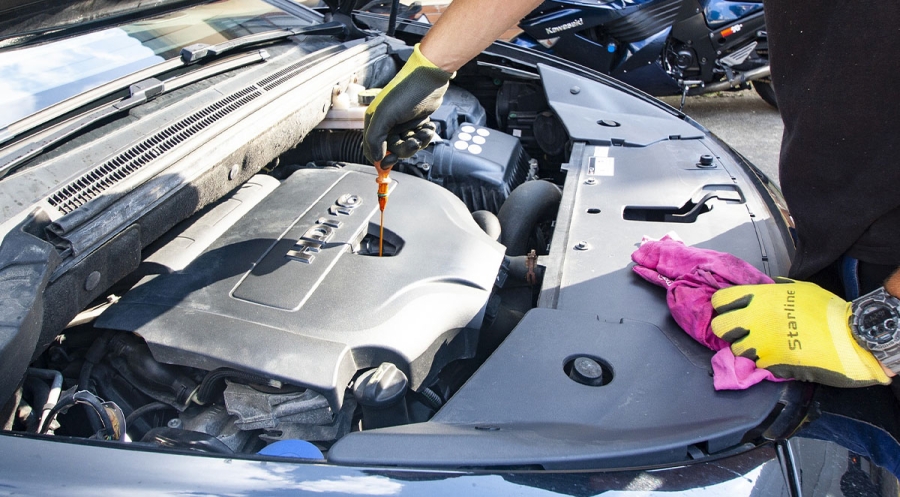When the weather starts to change, it is essential to get your vehicle serviced and prepped for the colder temperatures of winter. It is the time to ensure that your battery, charging system, antifreeze, tires, and cooling system are all in good shape. But as it goes, sometimes things don’t always go to plan, and you may end up needing to have some maintenance or basic repair done after freezing temperatures arrive.
What You Need to Know about Winter Oil Changes
Although some vehicle owners simply disregard changing the oil until it’s long overdue, this will become a significant problem eventually. Failing to change your vehicle’s oil on a regular basis could leave you stranded! And this is especially true as winter sets in.
Beneath your vehicle’s hood, a complex system of pistons, valves, and other components reside. These moving parts include valves and pistons, which create a lot of friction and heat. Your engine oil is there to make sure all of those moving parts are lubricated.
Over time no matter the road surfaces you frequent, dirt and debris will collect on your engine components, and your engine’s oil will degrade, impairing its ability to protect your engine via heat absorption. A quick look at old oil and you can tell the difference as it darkens and becomes thicker.
And this is where winter can compound the problem. As temperature drops, all liquids begin to become more solid. They may not all freeze completely, but they resist flowing smoothly, and engine oil is no exception.
How Bad Oil Effects Winter Driving
In the best driving conditions, bad oil can lead to an overheated engine and accumulating dust and grime that damages internal engine components. When cold winter weather sets in, oil that has already lost its needed viscosity puts added stress on the engine.
Dirty thick oil will refuse to move around the engine properly or not at all. This resistance to moving has a number of cascading effects on the engine:
- Resistance in the engine compartment wears down other parts leading to potentially expensive repairs.
- Forcing overly thick oil through the oil filter can cause pressure to exceed what clamps and sealing rigs can withstand, causing leaks.
- At a certain thickness, the oil may impede your engine's ability to run at all, potentially leaving you stranded without a working vehicle.
Tips for the Self Mechanic
The good news for home mechanics who want to change out their vehicle's oil and filter themselves is that you don’t need to worry about different grades of viscosity. Modern oils have a wide enough range to work properly throughout both summer and winter for most individuals.
The two exceptions to this are very old vehicles or areas that regularly see extremely cold temperatures. But for the Carolinas and most of the east coast, the manufacturer-recommended oil grade for your car or truck should see you through all seasons.
When performing the oil change, if you can, do so in at least a lightly heated space, as it can make the process much smoother. But if you don’t have a garage or a way to heat the one you do have, run the engine on idle for around five minutes. You don’t want to get the oil hot, but just get enough warmth into the oil that it begins to flow easily. Cold oil can take forever to drain properly.
Preventative Maintenance Is Best
Regular oil changes are a small investment to protect the expensive components of your car or truck’s engine. And changing the oil on a regular basis also will also help to improve your fuel mileage as well. You want to have your oil changed before it breaks down, but when that happens depends a bit on your vehicle, where you live, and how you drive.
Newer cars typically only need to have an oil change every 5,000 miles. Some engines today rely on synthetic oils, and that means they can go much longer than 5,000 miles between changes. Older vehicles, though, should have an oil change every 3,000 miles. If you tend to drive at high speeds or you live on a gravel road, you may need to have it changed even more frequently.
Even if you don’t plan on driving a particular vehicle through winter and intend on storing it instead, giving it an oil change and fluid check can clear any contaminants that can damage the engine over time.
Schedule Oil and Winter Maintenance Today
Get ahead of any cold weather-related issues by getting your oil changed and other car systems inspected and maintained by a trusted professional.
For drivers in the Goldsboro area, you will not find more experience and expertise than Retro Lube Oil Change. We have been helping car owners protect their vehicles through routine maintenance practices for many years. Don’t let the name fool you; we are more than just oil change experts. Our services include:
- Fuel Injection Cleaning
- Oil & Filter Changes
- Brake Servicing
- Fluid Flushes
- Tire Rotations
- NC Inspections
You can give us a call to set up an appointment or bring your car by the shop today. We will help you get back on the road quickly and safely.
